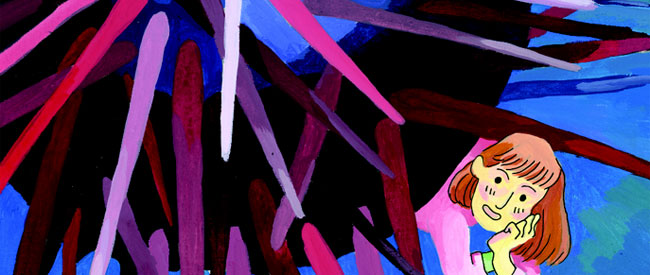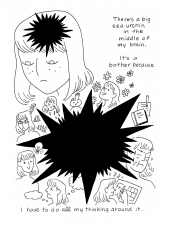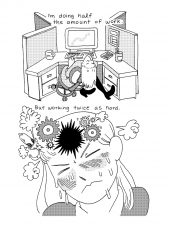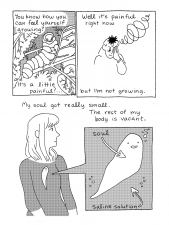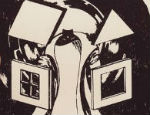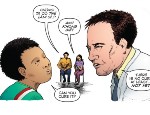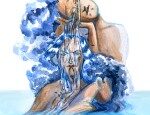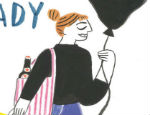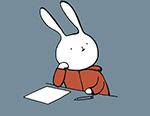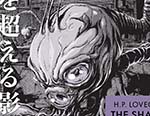In the latest book from Retrofit Comics, Laura Knetzger uses her airy cartooning style to create a number of potent and imaginative metaphors for the experience of depression, while also highlighting the healing power of art.
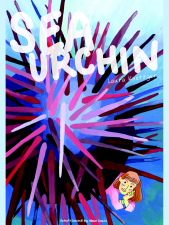 As we’ve flagged up passionately in the past, there’s something special about comics – the infinite stylistic possibilities, the ability to make the invisible visible, the intimacy of the act of putting pencil to paper – that makes them a powerful vehicle for the exploration of states of mind.
As we’ve flagged up passionately in the past, there’s something special about comics – the infinite stylistic possibilities, the ability to make the invisible visible, the intimacy of the act of putting pencil to paper – that makes them a powerful vehicle for the exploration of states of mind.
In Sea Urchin, a 60-pager from Box Brown’s Retrofit Comics (in collaboration with Big Planet Comics), Seattle-native cartoonist Laura Knetzger uses the form to record the intangible but very real experience of depression through a mosaic of vignettes and reflections (even if the Black Dog is never named specifically).
Knetzger delivers a series of effective metaphors for her condition and the effect it has on her life. These centre on the “sea urchin” of the title – a spiky, malevolent thing that she imagines as an unwelcome and obstructive presence in the middle of her brain.
Elsewhere in the book, every sound becomes a mouth, chewing on her, or a little hand, touching and then invasively reaching inside her. In a hidden jungle temple, a carving keeps turning its face inward, away from the world. Laura the Explorer has to venture into the wilderness and turn it back.
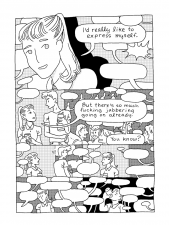 The book is driven by the tension between the airy style of Knetzger’s cartooning and the jagged edge of her feelings and observations. She brings an admirable honesty and clarity to a condition that – paradoxically – can strand its victim in the thickest of fogs.
The book is driven by the tension between the airy style of Knetzger’s cartooning and the jagged edge of her feelings and observations. She brings an admirable honesty and clarity to a condition that – paradoxically – can strand its victim in the thickest of fogs.
The playfulness of her art creates a light touch that belies the seriousness of her subject. This is epitomised in an early sequence, when Laura gives her well-meaning but flaky “r u ok hun” friend a brutally candid summary of how she has really been.
Sea Urchin is a pacy read. Knetzger rattles through the images with such brio that despite the obvious distress faced by her ‘fictional’ self, the reader never feels helplessly bogged down or suffocated. The procession of words and images forms a swell of momentum and, ultimately, a sense that despite the obstacles put in its path, life can find a way.
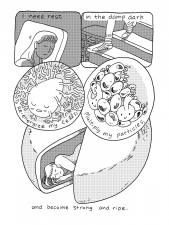 Knetzger certainly doesn’t depict herself as a totally passive victim. Along the way she finds opportunities to score little victories: an act as simple as mustering the resolve to pet a dog in the street gives her a surge of self-worth.
Knetzger certainly doesn’t depict herself as a totally passive victim. Along the way she finds opportunities to score little victories: an act as simple as mustering the resolve to pet a dog in the street gives her a surge of self-worth.
Even the existence of the comic itself suggests the possibility of hope. The book ends on a rising movement, with the acknowledgment that art in general, and comics in particular, can give people the power of self-expression and the ability to connect with others.
By chronicling her experiences in Sea Urchin, Laura Knetzger lights a torch that shines all the brighter for the gloom that surrounds it.
Laura Knetzger (W, A) • Retrofit Comics/Big Planet Comics, $8.00 (print), $4.00 (digital)





